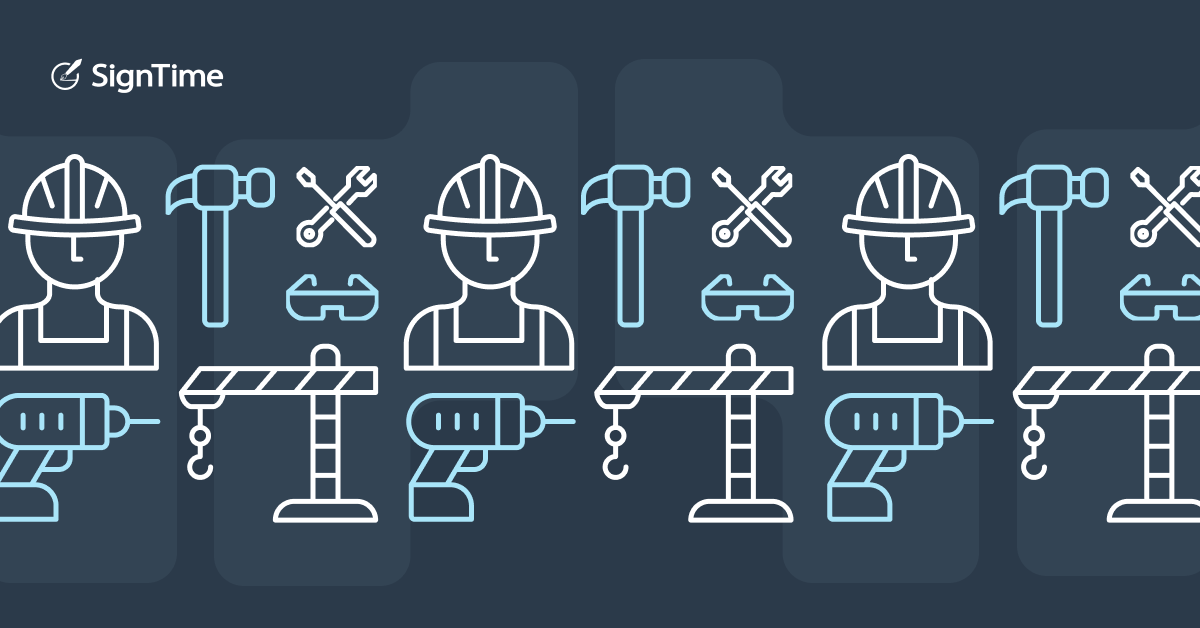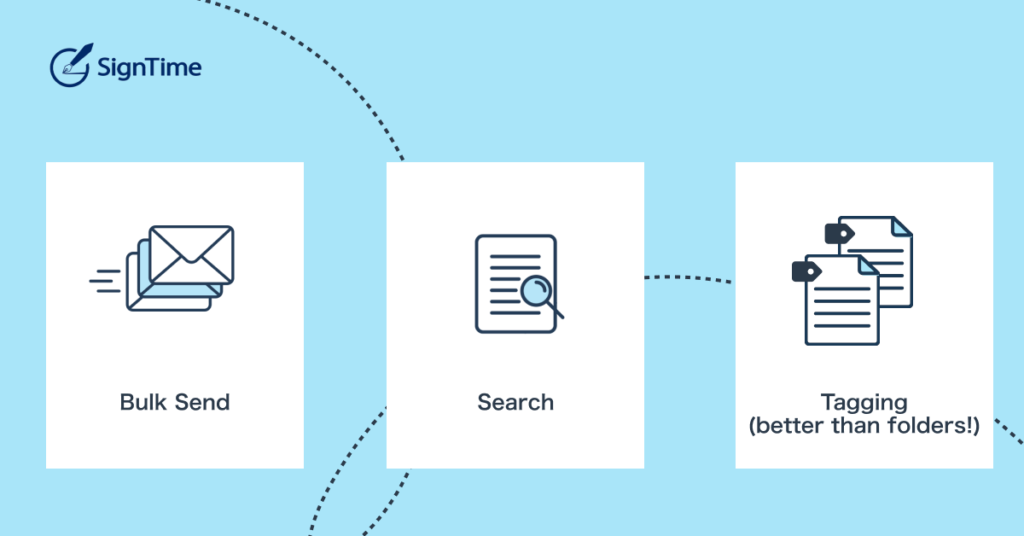release:
update:
SignTime Solutions for the Construction Industry

Table of contents
This month, we’re taking a look at an industry vertical that is rapidly growing and has some very unique contracting requirements in Japan. That industry is construction. Construction typically has been one of the most analog businesses in Japan, where the focus has been more on CAD drawings and heavy machinery rather than back office optimization and effectiveness. So today we will be discussing some of the ways construction companies use SignTime e-signatures.
Background
The Japanese construction industry, as one would expect in the world’s third largest economy, is a pillar of growth and economic development in the country. In 2025, the Japanese construction industry is estimated to be worth USD 629 billion, and will represent approximately 5% of the Japanese economy. After an extended period of stagflation following the burst of the Japanese property bubble in the late 1990s, the industry has seen moderate growth in recent years and is forecast to grow at a 3.3% annual rate over the next five years. Also, with the contraction of the population of Japan, there is an estimated .5M person labor shortfall in construction. While this is addressed to some degree by immigration, it is an ongoing issue which first really entered the public awareness during the Tohoku earthquake reconstruction.
Furthermore, there are labor law changes vis-a-vis the total possible amount of overtime worked per person/month, etc., where historically long hours might have been able to at least marginally address this issue, but this is no longer the case.
According to Japan’s labor laws, specifically the regulations introduced with the work style reform (働き方改革) in 2019:
Maximum Working Time in Six Months
For most industries, including construction, the maximum allowable overtime is 360 hours per year under regular circumstances. However, with special agreements (特別条項付きの36協定), it can go up to 720 hours per year, with a limit of 80 hours per month averaged over any six-month period.
This means the maximum overtime allowed in six months is 360 hours under these special agreements. Combined with regular working hours, the total working time would depend on the weekly working hour limit, typically 40 hours per week.In Japan, under the Labor Standards Act and subsequent work-style reform regulations, the following monthly limitations on working hours (including overtime) are applied:
Standard Monthly Overtime Limit
- Overtime is generally limited to 45 hours per month.
- This is the maximum for regular cases without a special agreement (36協定).
Special Agreement (36協定特別条項付き)
If a special agreement is in place (特別条項付きの36協定), additional overtime is allowed, but with strict conditions:
- Maximum monthly overtime: Up to 100 hours, including work on holidays.
- Six-month average limit: Overtime must not exceed an average of 80 hours per month over any six-month period.
- Overtime beyond 45 hours per month can only occur in six months out of a year.
Absolute Cap on Working Hours
- Total overtime cannot exceed 720 hours per year under any circumstances, even with a special agreement.
Combined with regular working hours (typically 40 hours per week), total monthly working hours should not exceed 240–260 hours, depending on the number of workdays in the month.
Additional Notes
- These limits are designed to prevent overwork-related health risks, and specifically karoshi 過労死, literally working oneself to death.
- Special rules apply to specific industries like construction, where transitional measures may allow for slightly different limits. For example, in construction, full compliance with these caps has a phased implementation to accommodate industry challenges.
Industry Structure
In an economy as large as Japan, as one would expect, there are tens of thousands of construction firms involved in the industry; however, at the very top of the pyramid, there are five industry giants that dominate: Shimizu Corporation, Obayashi Corporation, Taisei Corporation, Kajima Corporation, and Takenaka Corporation, collectively known as the Big 5.
As of fiscal year 2023, Japan’s Big 5 collectively generated approximately 10.4 trillion Japanese yen in revenue, roughly 16% of the total 65 trillion yen/year of the industry.
As of March 2024, Japan had approximately 470,000 licensed construction companies.
Among these, around 103,000 businesses had a capital size between three to five million Japanese yen (roughly 20-35 thousand USD at today’s rates), which are typically very small companies. In addition, there are roughly 68,000 sole proprietors operating within the construction sector.
Challenges
Like many advanced economies with an aging population, the construction industry in Japan faces major challenges due to a decreasing pool of qualified construction workers and the aforementioned caps on overtime hours. As a result, the industry has placed a high priority on digital transformation projects and driving productivity in the workforce. Technologies like digital design (CAD/CAM), Virtual Reality/Augmented Reality, drone technologies, ERP, digital scheduling and more, have been heavily deployed by the industry, but not much focus has been placed on back office operations.
e-Signatures and Electronic Contracting in Construction
Unsurprisingly, the Japanese construction industry was an early adopter of e-signature technologies and is a major industry vertical for SignTime. Due to the complexity and variety of contract types and clauses in the industry, electronic contracting in construction in Japan has some very unique requirements. Some contract and form types that are common in the industry include:
- Partnership agreements – between two or more construction firms for job specific projects
- Contractor/subcontractor contracts – one of the most common forms of contract in the industry where subcontractors like electricians, plumbers, concreters, make job specific contracts with the general contractor
- Quotations – most quotations for work are done on either paper or via excel and typically require multiple internal approvals
- Standard building contracts – between builder and client
- Remodeling construction contracts and change orders
- Purchase Orders – often used frequently for input materials like steel, timber, concrete, and more
- Workforce contracts – many construction firms have a flexible workforce and scale up and down staffing requirements
- Planning forms and contracts – typically between a builder and a municipality or other government agency
- Subcontractor price acceptance/refusal: this is a very unique feature of many Japanese construction contracts – where a subcontractor has the ability to accept, refuse or counter pricing components in a contract from a general contractor. (SignTime has some very innovative features to support these clauses coming in February this year, so stay tuned!)
- Maintenance agreements – typical in post build agreements
- Outsourcing agreements for construction franchisees
SignTime makes it easy to manage the intricacies of all these contract forms in construction through use of e-signature templates. Further, SignTime’s focus on SMS delivery enables construction sites to get sign-offs on site immediately rather than waiting for access to an office PC.
Other standard features like SignTime bulk send are ideal for workforce employment agreement, while templates and tagging functions help to keep track of change orders, invoice and customer numbers and subcontracting agreements. Reminders and alerts can be used extensively for contract expirations, renewals, due dates and more.
For companies looking to seamlessly integrate digital contracts and reporting into their existing workflows, SignTime’s API integration offers customizable and automated solutions. The API allows for real-time synchronization with ERP, HR, accounting and project management systems, ensuring that subcontractor agreements, contract approvals, estimates, document management, reports and compliance are efficiently sent and managed without any manual steps.

With the ability to securely store all agreements in the cloud, and readily access documents via SMS/mobile, table or laptop devices, SignTime is an ideal e-signature and electronic contracting solution in an industry that is always on the move – and frequently operates outside of a normal office environment.For more information on our suite of features that are ideal for the construction industry visits the features section of our website.
